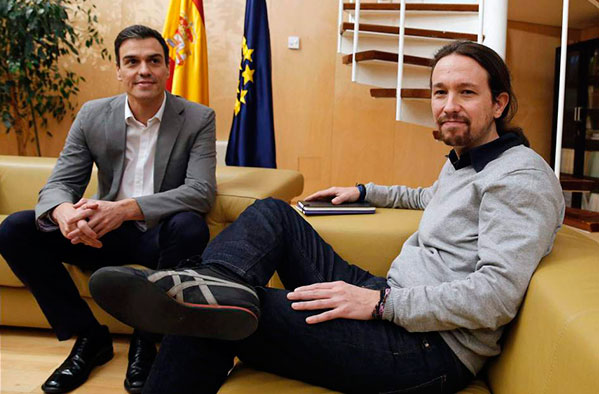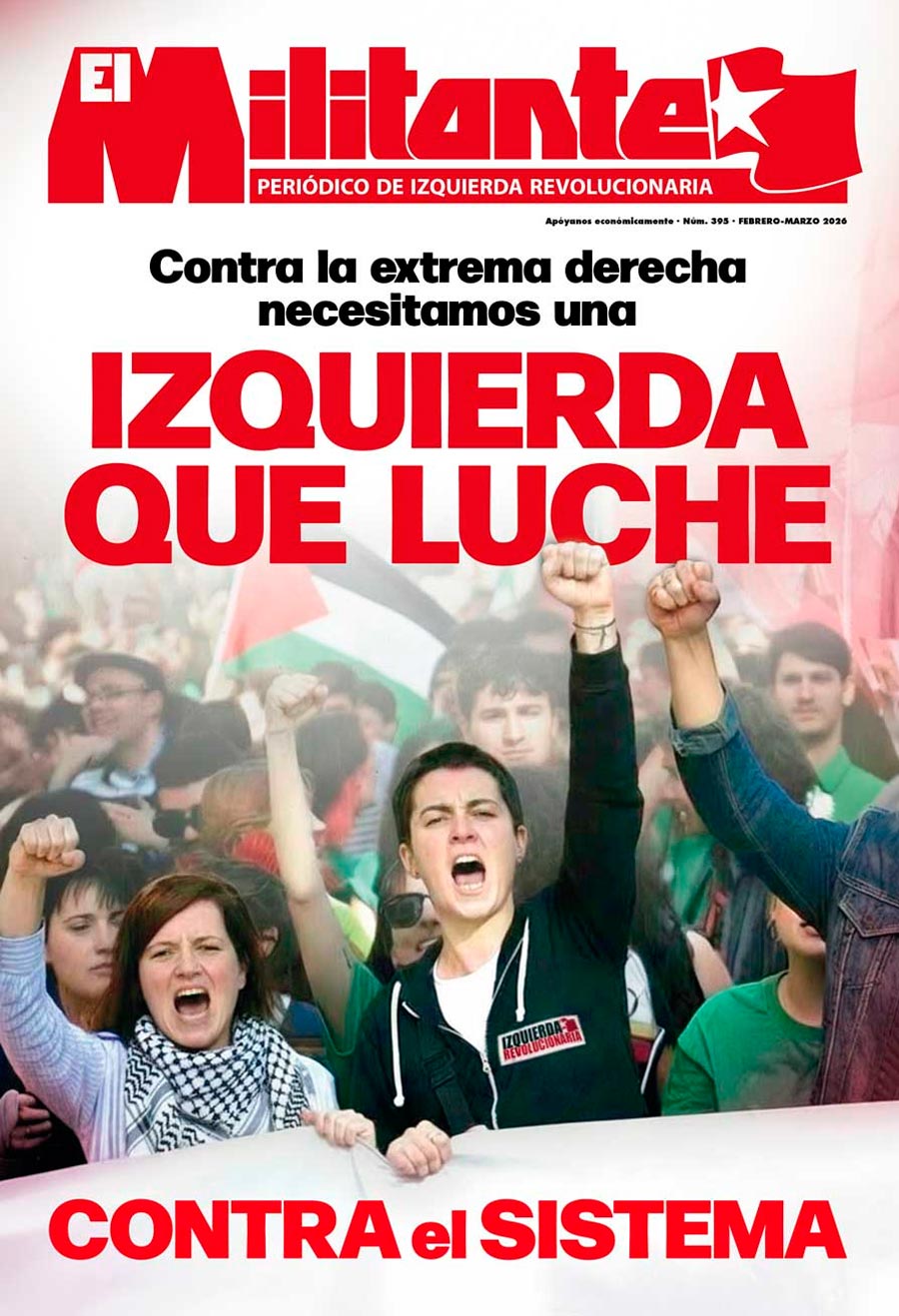Two months after the general elections of April 28, the negotiations for the constitution of PSOE government are going through its most critical phase.
The elections were marked by an important mobilization of the Left’s social basis, in order to stop the far-right and bar the formation of a PP-Ciudadanos-Vox government. This was the fundamental reason behind the increased vote in PSOE and is not blank check to Pedro Sanchez*.
The political polarisation in the current period had a negative effect on the reactionary block, which amassed two million votes less than the combination of left parties. This negative result is even more significant if we take into account the PSOE’s lack of willingness to break with the cuts and it’s insistence on carrying on the previous government's austerity policy, as well as the turn of Podemos’ leadership towards institutional reformism. Against any shallow interpretations, an explanation and analysis of these results needs to be based on the massive social mobilization of the previous and present years and the rejection, by millions of people, of the rotten programme of spanish nationalism.
Having it both ways
After the elections, PSOE’s leadership tries to have one’s cake and eat it. On one side, they are trying to get the agreement of Podemos to form a PSOE government using a “collaborative government”, which allows them to tie Pablo Iglesias to their political management. But behind these diversion manoeuvres lies their true intention: to have their hands free to keep deepening an economic policy which agrees with the demands of the european and spanish bourgeoisie regarding budget cuts and new structural reforms.
To achieve this objective, PSOE needs a strategic agreement with Ciudadanos, which would mean that the latter would abstain in the Government’s appointment and it would occasionally support antisocial and antidemocratic measures which would be hard to swallow by Podemos and the leadership of Catalan independence parties. Even after the outcry of “with Rivera (Ciudadanos leader), no” that was heard in Sanchez election night rally, multiple approaches between PSOE and Ciudadanos have been seen at regional and municipal level.
Pedro Sanchez does not disagree with a wager which is the same as the one from the big banks and Ibex 35 (Spanish Stock Exchange), given the impossibility of forming a right-wing (Ciudadanos, PP and Vox) government. This wager consists in a “stable” PSOE government on its own, that is able to be supported by a varied parliamentary geometry that allows it to deepen the social cuts, keep the PP counter reforms and deny the Catalonian people its right to decide.
Crisis in Ciudadanos
However, the first obstacle to this plan has come from Ciudadanos. Albert Rivera’s objective is to use the crisis of PP to win the majority within the Right political space. An objective which he has not yet achieved, but that he has not yet renounced.
To this end Ciudadanos has adopted, during the crisis in Catalonia, an extremely reactionary Spanish nationalist position which leaves nothing to envy from PP or Vox. Rivera contended the general elections with a program that purported to kick out the PSOE government and to create a “sanitary fence” against Sanchism**. To be now transformed in the main support for a government led by someone he classified again and again as a “nation-selling” element, friends with pro-independence parties and terrorists, is hard to swallow.
The bourgeoisie has exerted enormous pressure over Rivera, which, allied to its mediocre results in general, autonomic and municipal elections, it’s generating a serious crisis in Ciudadanos, with a torrent of defections and public differences by party leaders who agree with abstaining in the inauguration and dropping a rhetoric which has not achieved expectations. However, Rivera has kept steady in his positions for now.
This contradictory position is a clear symptom of the depth of the crisis in the ‘78 regime, and especially, the enormous complications faced by the bourgeoisie to stabilize the political situation.
Wide sectors of the ruling class want Ciudadanos to facilitate a PSOE government, although this step would make its consolidation as the replacement of PP (their initial idea) harder. They would like for political polarization to recede, for parliamentary games to dominate over social mobilization and for the big upheavals of the last few years to disappear. But neither PP nor Ciudadanos can forego its Spanish nationalist demagogy if they want to keep their social basis active.
The bourgeoisie would also like to put the lid back on the Catalonian question, which is, right now, the main focus of political instability. And, at the same time, to impose an exemplary punishment to the leaders of the procés*** which could be used as a warning to all those who question the power of the state apparatus inside and outside Catalonia- this is the intention of a judicial apparatus, which is the inheritor of Francoism. And the Spanish bourgeoisie cannot shed what constitutes its historical DNA.
Pablo Iglesias needs to urgently correct his position
To be inaugurated, PSOE needs the vote in favor of Podemos, and therefore Sanchez has no qualms in declaring Podemos as his “preferable partner”. However, this is a very calculated siren song.
In reality, after almost a year of government, PSOE has not reverted even one of PP’s attacks and reactionary laws. In the agenda of PSOE’s prospective government, there is already a commitment (with Brussels) to cut around 7.000 million euros in the next state budgets and that the rise of pensions stops being connected to inflation from 2020. The Minister for Economy has also made
Regarding Catalonia, in the central aspect, which is the right to decide, Pedro Sanchez is totally aligned with PP and Ciudadanos. And it has not uttered a word against the shameful Supreme Court decision which has halted Franco’s exhumation.
PSOE is exerting a lot of pressure over Podemos. If they cannot get the purple formation support, they want the responsibility of failing to form a left government to completely fall on the shoulders of Podemos.
The problem of Podemos is that it has a clearly mistaken strategy. Hiding behind its parliamentary frailty, Pablo Iglesias has renounced even the most minimal programmatic demand. All emphasis is in the appointment of Podemos’ ministers, with an argument which is a fake as it is shallow and contradictory. If Podemos does not have the strength to demand anything, why would its entry into a PSOE government force the latter to enact politics that would benefit the working-class? Would, by any means, its mere presence, with a couple of decorative ministers, change the strategy of social democracy and bend the will of the big banks and the state apparatus?
The only way to pressure PSOE, and to unmask its maneuvers and fake “progressive character” is to put on the table a program that channels the aspirations of millions of left voters:
-Immediate repeal of all reactionary laws passed by PP (labour reform, pension reform, Gag Law, LOMCE (reactionary education law…), as well as reversion of all social cuts.
- Immediate refund by the banks of the more than 60 000 million euros given to them by the State.
-Drastic increase of public spending in public health and education in the next State Budgets.
-Ban by law of evictions and a shock plan to create, in the next four years, two million public houses with accessible social rents.
-Immediate nationalization of the big electrical and energy companies to end energy poverty and defend the environment.
-Increase the National Minimum Wage and minimum pension to 1200 euros a month
-Put out fascists from the state apparatus, the police, the army and the judicial system. For social, economic and political redress of victims of Francoism.
-To struggle with enough material and human resources against sexist violence and patriarchal justice.
-For the right to self-determination. Annul the trial against the Catalan political prisoners.
This is the programme that should be publicly defended by Pablo Iglesias and the leadership of Podemos, instead of begging for cabinet positions- and they should call for the widest and most determined social mobilization to implement this plan. But, for a while, the leadership of Podemos has renounced a similar program and renounced to base itself in the organized power of the working-class and youth. This is the actual source of its weakness.
Apart from the outcome of this preparatory movements for the possible inauguration of Pedro Sanchez government, is more than obvious that the economic downturn, including the fall in a new recession, to underline a significant possibility, draws a future of instability and great struggles.
The most urgent task is to build a combative left with roots in the working-class and youth movement, and which is able to charter a revolutionary alternative to this system. There is no other way. Join the Revolutionary Left!
* leader of PSOE
** The political wing of Pedro Sanchez supporters in PSOE
*** the name given to the political process behind and through the Catalonian right to decide, which reached its peak in the 1-O election which was violently repressed by the spanish state





















































